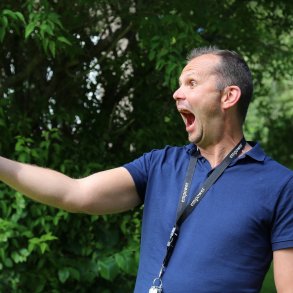By Otti Vogt (Part of a reflection on System Psychodynamics for INSEAD) and originally published on medium.com/@otti.vogt
Part 2 of a 2 part series. Part 1 is here.
The Urgent Case for A Global Leadership Iconoclasm
From Organisational to Individual Transformation
As Otto Scharmer suggests [10], in order to instigate large-scale societal change, we must “bend the beam of societal reflection back onto ourselves”. We are the system. It took myself 25 years to acknowledge this profound truth.
As a senior executive in global Fortune 500 companies, I’ve spent most of my career trying to become a “good” leader. I attended more Leadership seminars than I care to remember. I accumulated a library of Leadership bestsellers and earned a top-notch MBA. I am proud owner of a vast collection of psychometrics, 360-degree-feedbacks, personality analyses, development plans.
Yet, I never fathomed that I was largely stuck in a mindset of unexamined ideologies accumulated from the outside, and reactive thought and behavioural patterns developed at the inside — often alienated from a deeper self…
Everything started to crystallise when at one stage I found myself in unprecedented difficulties to “drive change”. The situation was hugely pressurised, incentives misaligned, accountabilities unclear, plans complex, personalities plenty. Failure was no option and I pushed hard, yet things only got worse.
Frustrated, I started to explore novel approaches and, serendipitously, encountered “system psychodynamics”. This particular coaching approach puts its focus not on visible behaviours, above the proverbial iceberg, but on the internal system of the organisation — revealing unconscious dynamics within and between individuals and groups, and on the organisational context.
I entered an inspiring submerged world. Everything I thought I knew, suddenly took on a different significance. Adopting a “vicarious listener” stance, I learned to detect and decipher underlying and ever-present anxieties in individuals and teams, and support others in increasing the quality of their attention, interrogating the systemic relationships within and around them.
I discovered, flabbergasted, that “our inner theatre is our outer theatre” — how early family relationships continue to effect relational patterns in adult life, how societal expectations shape our “idealised” egos and how we automatically and destructively protect those “accidental selves”, projecting our shadows onto others. As Jung said “until you make the unconscious conscious, it will direct your life and you will call it fate.”
Intrigued by new insights, I immersed myself into practices to attain deeper awareness and self-reflection. Eventually “hitting my own iceberg” I increasingly realised how profoundly I had construed my own reality. Gradually confronting my own fears and tentatively letting go of my own protective ego, the quality of my relationships rapidly deepened and continuous learning became more important than “being right” or hitting goals.
Promptly, the organisation around me started to flourish. Self-organisation and experimentation thrived. Over time, we launched initiatives to enhance hierarchy with “sociocratic” circles; deployed signature practices to cultivate kindness, trust and kinship; established reflective peer and team coaching for executives; experimented with equivalent decision-making by consensus; and started to modify traditional performance management.
Synchronously, my purpose shifted from keenly protecting myself in pursuit of “success”, towards becoming “systemically responsible”, serving others. I began to acknowledge the Organisation as “living being” [11], rather than deterministic machine [12], and — integrating “head and heart” — my role transformed from instructing others (or working overtime myself) into an “organisational acupuncturist”.
Focused on containing, sparking and liberating the invisible energy flows in the “organisational body” and enabling the system to thrive. Thus, work again had profound meaning.
Frankl appropriately suggested: “The more one forgets himself — by giving himself to a cause to serve or another person to love — the more human he is and the more he actualizes himself”. [13]
From Servant to Eco Leadership
Today, I am thoroughly convinced that sustainable organisational transformation is impossible without concurrent individual transformation, in service of a greater purpose.
The maturity of an organisation cannot transcend the maturity and consciousness of its leaders. If greater consciousness doesn’t operate, a system does not possess the stability to let go of the past and transition to a new model, without losing its sense of identity and cohesion. [14]
At a personal level, “Servant Leadership” [15] is not about traits or behaviours, but about virtuously pursuing a “self-transforming” stage of adult development [16], where deep clarity of self-awareness and self-regulation springs from a spiritual and “transpersonal” [17] motive to serve others [18].
Mature leaders, says Manfred Kets de Vries, are not only born but “twice born” through painful “individuation” [19] — “defeating their own Dracula” [20]. Bill Torbert describes Servant Leaders as “Alchemists” [21] who co-transform themselves and the world around them, mastering the delicate art of “action inquiry”.
By attuning themselves moment-to-moment with their own self, their relationships around them, and their intentionality, they “cultivate the development of the systems in which they participate” [22].
At the organisational level, Servant Leadership means letting go of authority and cultivating a nurturing context to liberate the unique potential in everyone. About people no longer being victims of circumstances, but thriving in the creation of new possibilities.
About generating a distributed and regenerative leadership capability, an “eco-centric” flow of energy — what we, collectively, are able to bring to life. From doing to being. From fear to love [23].
Talking about a fifth revolution
In order to heal our world, we must stop polishing leadership icons on the altars of modernity and accept personal accountability, as trustees of an endangered ecocivilisation. Social materialism has repressed the primordial energy of loving interconnectedness. We are plagued by guilt of feeling unworthy and absorbed by fear of “attempting anything truly great” [24].
Whilst our planet is burning, most of us remain stuck in the phantasy that the world is a lonely, dangerous place and change is impossible.
Together, we must eventually face our collective leadership mid-life crisis [25] and let go of leading to start serving! We must roll up our sleeves and jointly craft the organisations, processes, and cultures needed to attain both individual flourishing and the emergence of a regenerative collective purpose.
Not coincidentally, Greenleaf titled his celebrated booklet “The Servant as Leader”, not “The Leader as Servant” [26]: selflessly, like modern masons we must construct humanity’s new secular cathedrals — as shared beacons of hope and transcendence towards a sustainable future.
Servant Leaders of the world, unite! We are not leaders because we rule. We are leaders because we truly care. [27]
Otti Vogt: Disruptive thinker, amateur poet and passionate global C-level transformation leader with over 20 years of experience in cross-cultural strategic change.
References
[10] E.g. Scharmer/Kaufer, Leading from the Emerging Future: From Ego-System to Eco-System, 2013
[11] Wolfe, The Living Organization: Transforming Business to Create Extraordinary Results, 2011
[12] Sanford, Language as Clue — The Effect of Paradigms on Creating Systemic Change in Business, 2015
[13] Frankl, Man’s Search for Meaning, 1946
[14] Hamel/Zanini, Humanocracy: Creating Organizations As Amazing As the People Inside Them, 2020
[15] Greenleaf, Servant Leadership [25th Anniversary Edition]: A Journey into the Nature of Legitimate Power and Greatness, 2002
[16] Kegan, The evolving self, 1982
[17] Knights, Leading Beyond the Ego: How to Become a Transpersonal Leader, 2018
[18] Eva/Robin/Sendjaya/van Dierendonck/Liden, Servant Leadership: A systematic review and call for future research, The Leadership Quarterly 30 (2019)
[19] Kets de Vries, The Leader on the Couch: A Clinical Approach to Changing People and Organizations, 2006
[20] Dernoncourt, Defeating Dracula: A Romanian Retail Giant’s Quest for Freedom and Trust, 2020
[21] Torbert, Warren Buffet’s and Your Own Seven Levels of Transformation, 2020
[22] Torbert, Action Inquiry: The Secret of Timely and Transforming Leadership, 2004
[23] Tobiasen, The Heart Revolution, 2020
[24] Rice, A Hundred Ways to Sunday, 2001
[25] Petriglieri, Are Our Management Theories Outdated?, hbr.org, 18/06/2020
[26] Greenleaf, The Servant as Leader Pamphlet
[27] Marty in: Sloane Coffin, The Riverside Years, Volume I, 2008




